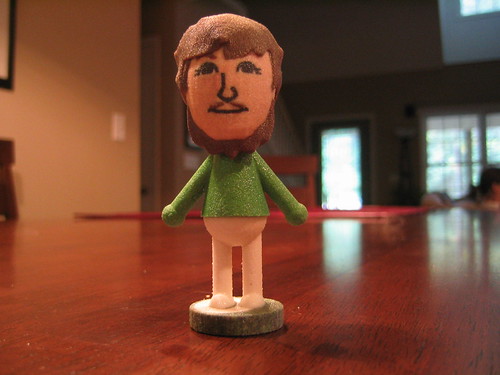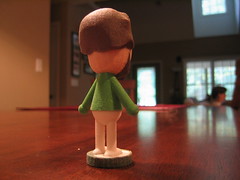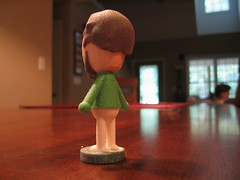*sigh*
Karen Schneider twittered the latest Michael Gorman insanity, written on (no surprise here) the Britannica Blog. Long time readers of this blog might remember that I’ve publicly disagreed with Gorman on a number of things, and this latest rant isn’t any different.
In Web 2.0: The Sleep of Reason, Gorman rambles over the landscape of authority, truth, and web 2.0 like a lost puppy, not quite sure where he’s supposed to be going, but sure he has a destination. And that destination is TRUTH. I believe that he has no idea what he is talking about re: Web 2.0, and that his article clearly illustrates the significance of his misunderstanding.
Let’s begin with some examinations of his quotes, shall we? The opening paragraph is a doozy:
The life of the mind in the age of Web 2.0 suffers, in many ways, from an increase in credulity and an associated flight from expertise. Bloggers are called “citizen journalistsâ€; alternatives to Western medicine are increasingly popular, though we can thank our stars there is no discernable “citizen surgeon†movement; millions of Americans are believers in Biblical inerrancy—the belief that every word in the Bible is both true and the literal word of God, something that, among other things, pits faith against carbon dating; and, scientific truths on such matters as medical research, accepted by all mainstream scientists, are rejected by substantial numbers of citizens and many in politics.
I suppose we’d be better off, Michael, if journalists were required to get a governmental approval pass before they could write? The US has a long history of “citizen journalism”…if Thomas Paine were alive today, he’d have a blog.
And to equate the social movement inherent in Web 2.0 with creationism and alternative medicine is not only a category mistake of the largest sort, it is also just insane. It isn’t that there is a “flight from expertise”, Mike…it’s that we are re-defining “expert”. You sound like the Catholic loyalists railing against the Protestant movement…only the priests are allowed to talk to God! Bibles will only be printed in Latin!
The fact that information changes forms or source has no effect on its Truth. Truth judgments arise because the information itself is reflective of the world at large, testable and reproducible in the case of claims about the world (scientific claims) and verifiable in the case of claims about information itself. The goddamn source of the information has absolutely no bearing on the truth of it. None. Zero. Nada. Ziltch.
Ah, but Mike has a bit about that:
Print does not necessarily bestow authenticity, and an increasing number of digital resources do not, by themselves, reflect an increase in expertise. The task before us is to extend into the digital world the virtues of authenticity, expertise, and scholarly apparatus that have evolved over the 500 years of print, virtues often absent in the manuscript age that preceded print.
The reason that the “scholarly apparatus” evolved isn’t because of some desire to desperately produce only the best knowledge…it evolved because of economic pressures. In print, not everything can exist. Print costs money, and in the world of the academic the things we put our financial faith in, mostly, are things that pass the “scholarly test” of peer review. We have to have some limiting process because there is only so much money, NOT because the process itself is holy.
In the digital world, money is often the least of the concerns of information production. That simply means that we have to critically examine each piece of information as it lies with the web of knowledge, and draw coherence lines between the pieces. But we don’t want to get bogged down in the old way of doing things just because it worked in print. Digital is different, and demands different processes and analysis.
The structures of scholarship and learning are based on respect for individuality and the authentic expression of individual personalities. The person who creates knowledge or literature matters as much as the knowledge or the literature itself. The manner in which that individual expresses knowledge matters too.
Ummm…no? After holding up the Scientific Method so often in his article, you’d think he’d understand it a bit more. The point of the scientific method is to eliminate the person and make it about the knowledge, writ pure. The person does not matter, can not matter when it comes to the expression of the knowledge…keep in mind, we aren’t talking about the native intelligence necessary to invent or have insight. We’re talking about the information itself.
This is a rambling, nearly incoherent piece of writing when you try to connect logical lines between his arguments. He moves from comparing Web 2.0 to Creationism, to how his research on Goya done via print is the best way to do it, to comparisons between Web 2.0 and Maoism, to finally accusations of antihumanism.
I can’t decide if the whole article is best described as a Straw Man, Questionable Cause, or if it’s just one enormous fallacy of Appeal to Authority (yes, Virginia, that is a faulty method of thinking).
And let’s not ignore the final indignity: this is an essay decrying Web 2.0 posted on a blog, with multiple RSS feeds, and a Share This section for adding it to del.icio.us, Furl, Reddit, and Digg.
Irony, much?















